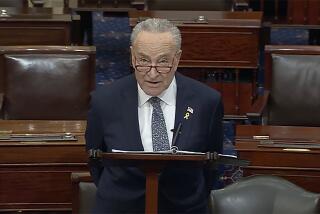Shamir Gets More Time to Form Israel Coalition : Herzog Grants 3 More Weeks, Calls on Labor and Likud to Renew Broad-Based Government
- Share via
JERUSALEM — Prime Minister Yitzhak Shamir on Monday was granted three more weeks to form a new Israeli government by President Chaim Herzog, who urged that Shamir stop negotiating with small right-wing and religious parties and instead create a broadly based coalition between his Likud Party and the competing Labor Party.
In an unusually blunt plea, Herzog, whose role places him above party politics, called on Likud and Labor to continue their four-year alliance in the nation’s interest.
“The country needs a broad government,” Herzog said after a meeting with Shamir at the president’s residence. “We need a stable government to deal with the challenges and dangers we face.”
With the prime minister standing at his side, Herzog sharply criticized the intense political maneuvering on all sides that has marked attempts to construct possible governing coalitions in the wake of inconclusive national elections Nov. 1.
‘Sense of Frustration’
“I believe I speak for the majority of Israel’s people when, in reaction to these developments, I express a sense of frustration, helplessness, humiliation and shame, as well as grave concern,” he declared, adding that he had received letters from hundreds of ordinary Israelis supporting that view.
At the same time, Herzog called on the next government to reform Israel’s system of proportional representation, under which 15 parties are represented in the Knesset (Parliament).
“There is nothing like this system in the entire democratic world,” he complained, describing as “incomprehensible” a system that has deadlocked political life in Israel for a month.
In the November elections, Likud won 40 of the 120 Knesset seats, while Labor took 39. Religious parties captured a total of 18 seats. Herzog originally gave Shamir three weeks to form a government; the extension granted Monday is allowed by law.
Before Herzog’s last-minute plea, there had seemed little likelihood that the uneasy Likud-Labor alliance of the recent past could be restored.
Shamir himself declared before talking to the president Monday that he had no intention of asking Labor to join a coalition again. He refused comment during his brief public appearance with Herzog.
Foreign Minister Shimon Peres, Labor’s leader, was summoned for talks today with Herzog.
Until Monday, many analysts were betting that Shamir would opt for a narrowly based coalition, probably to be pulled together by the end of this week.
Such a government, relying on small, strongly Orthodox religious parties for a parliamentary majority, would, in the view of many political observers, undoubtedly raise the fractious issue of “Who is a Jew?” almost immediately.
As the price of their joining a government, the religious parties insist that the government press legislation to deny citizenship under the Law of Return to persons converted to Judaism under the guidance of Reform and Conservative rabbis. The law currently grants immediate citizenship to all Jewish immigrants.
Strong Protests Heard
Such an amendment offends many secular Israelis. And many Reform and Conservative Jews, particularly in the United States, have strongly protested the proposal, which they say casts a reflection on their legitimacy. A delegation of American Jewish leaders is to meet Shamir today.
A coalition arrangement between Likud and Labor was actually agreed to last week by Labor’s top chieftains, but the deal was unexpectedly rejected at a meeting of the party’s executive bureau.
Overall, the negotiations to form a government have been marked by change and controversy.
It appeared late last week that Peres had made a deal on behalf of Labor with one of the religious parties, Agudat Israel, but the latter’s governing body Sunday turned down the arrangement, indicating instead that it was willing to unite with Likud, which has promised to support legislation giving Orthodox rabbis vastly increased power over public policy.
In another development, Yitzhak Rabin of the Labor Party accused Peres of conducting secret talks with the religious parties, and he derided senior Labor politician Yossi Beilin as “the poodle of Peres” for allegedly conducting negotiations without consulting other party leaders.
In retaliation, Beilin declared that Rabin, 67-year-old former prime minister and ambassador to the United States and now defense minister, “in his old age is an embarrassment. I would prefer to remember him the way he was when he was young.”
Rabin has said he wants Labor to join with Likud because, among other things, such an alliance would not have to raise the “Who is a Jew?” issue in the Knesset. Secular Jews also say they are worried that a government dependent on religious-party backing would ban soccer matches, movies and other public activity on Saturdays, the Jewish Sabbath.
More to Read
Sign up for Essential California
The most important California stories and recommendations in your inbox every morning.
You may occasionally receive promotional content from the Los Angeles Times.












